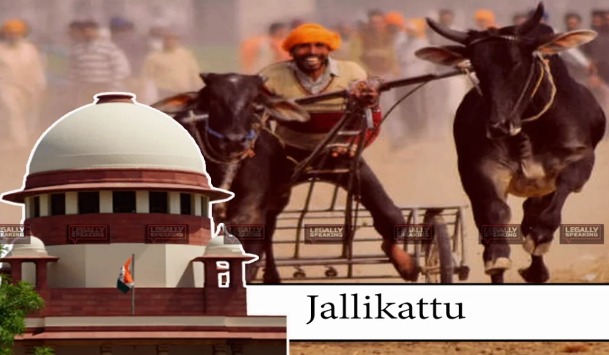
The Supreme Court on Thursday upheld the validity of Tamil Nadu’s amendments to the Prevention of Cruelty to Animals Act (PCA Act), thereby allowing the bovine sport ‘Jallikattu’ in the states of Tamil Nadu, Karnataka and Maharastra.
A Constitution Bench dismissed a slew of petitions contesting the constitutionality of these amendments. The states made these modifications after the Supreme Court prohibited ‘Jallikattu’ and similar acts in the case Animal Welfare Board of India v. A. Nagaraja And Ors. in 2014.
The amendments were introduced by a Constitution Bench of Justices KM Joseph, Ajay Rastogi, Aniruddha Bose, Hrishikesh Roy, and CT Ravikumar to lessen pain and suffering of bovines and to allow the sport to continue.
“There is no flaw in the state’s action. It is a bovine sport, and participation is permitted according to the rules. The act has nothing to do with Article 48 of the constitution. Incidental impact may fall on certain types of bulls affecting agricultural activity, but it is referable, in pith and substance, to Entry 17, List III of the Seventh Schedule to the Constitution of India,” the judgement stated.
The bench further stated that its judgement will apply rules on Kambala and bull-cart racing in Maharashtra and Karnataka, and that these regulations must be carefully implemented. District Magistrates have been asked to ensure strict adherence.
The Court further added that the TN Amendment Act does not violate Articles 51A(g) and 51A(h), and consequently does not violate Articles 14 and 21 of the Indian Constitution.
“All three amendment acts are valid legislations, and we direct that all laws be strictly implemented, and the DM and competent authorities shall be responsible for strict implementation of the amended law,” the Court stated.
In May 2014, the Supreme Court ruled that the popular Tamil Nadu ritual of ‘Jallikattu’ violated both the rights of the animals involved and the Prevention of Cruelty (PCA) Act.
Concerning the cultural side of the sport, the Supreme Court ruled that ‘Jallikattu’, as it is now practised, was never a part of Tamil Nadu’s culture or tradition. As a result, the Tamil Nadu Jallikattu Regulation Act of 2009 (TNJR Act), which governed the practise, was struck down.
The Central Government issued a new notification in January 2016 exempting ‘Jallikkattu’ and ‘bullock cart racing’ from the scope of the PCA Act. That notification was challenged in the Supreme Court.
The state government afterwards passed the Prevention of Cruelty to Animals (Tamil Nadu Amendment) Act of 2017.
These, in effect, prepared the way for bull-taming activities such as ‘Jallikatu’ to take place.
The notification and changes were challenged before the Supreme Court.
The petitioners’ counsel said that the evidence on record demonstrated that ‘Jallikatu’ was a bloodsport in which the bulls were forced to participate despite their inability to consent.
It was contended that Article 14 (right to equality) would apply because only some sports were permitted to allow cruelty to animals. Furthermore, asserting cultural rights cannot be removed from the criteria of reasonableness.
The President could not have given his consent to the legislation at all, and the right to dignity was invoked because humans did not want to see animals mistreated.
It was emphasised that ‘Jallikattu’ is not a right under Article 25 (freedom of religion) or a fundamental religious practise of any community.




